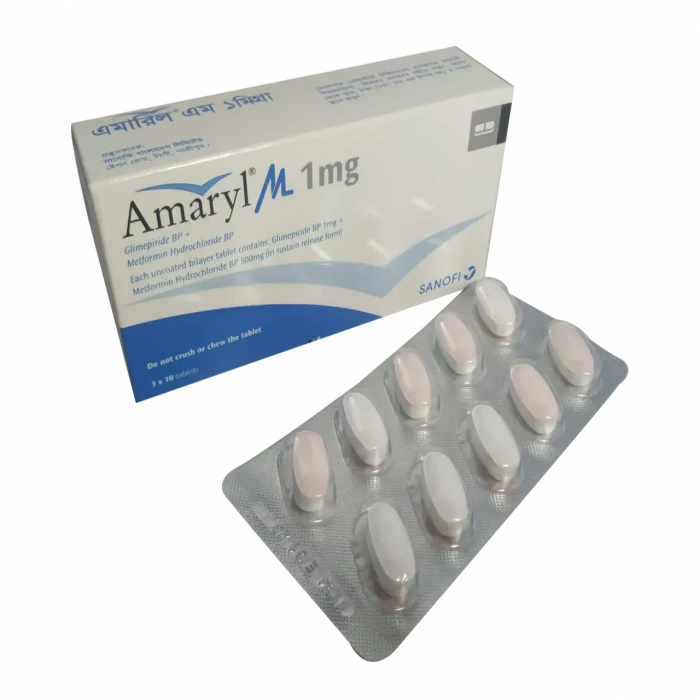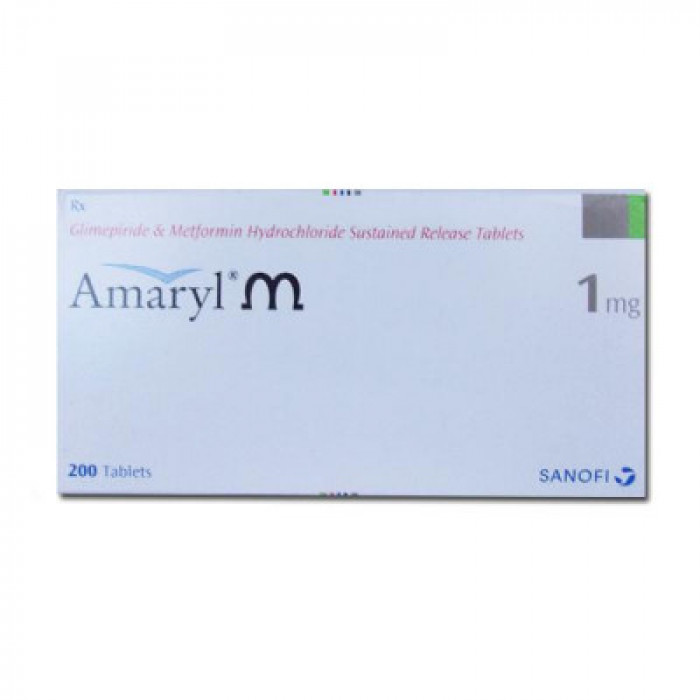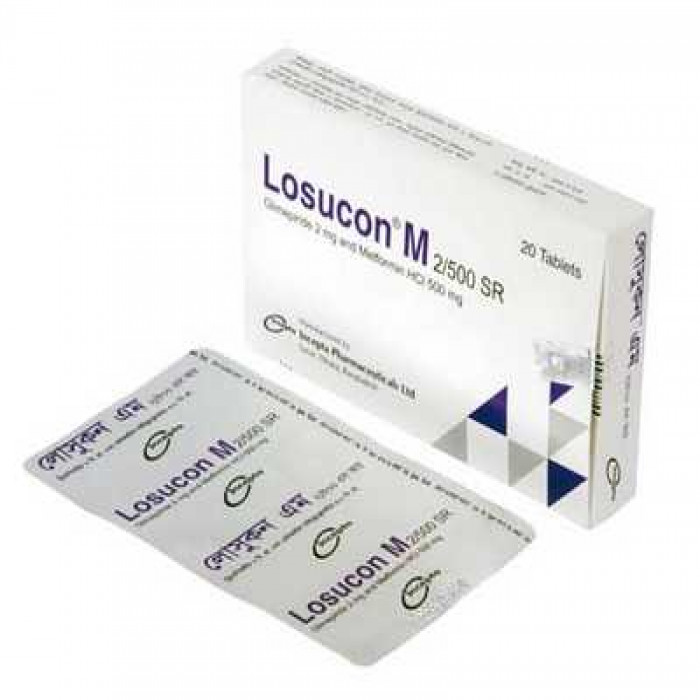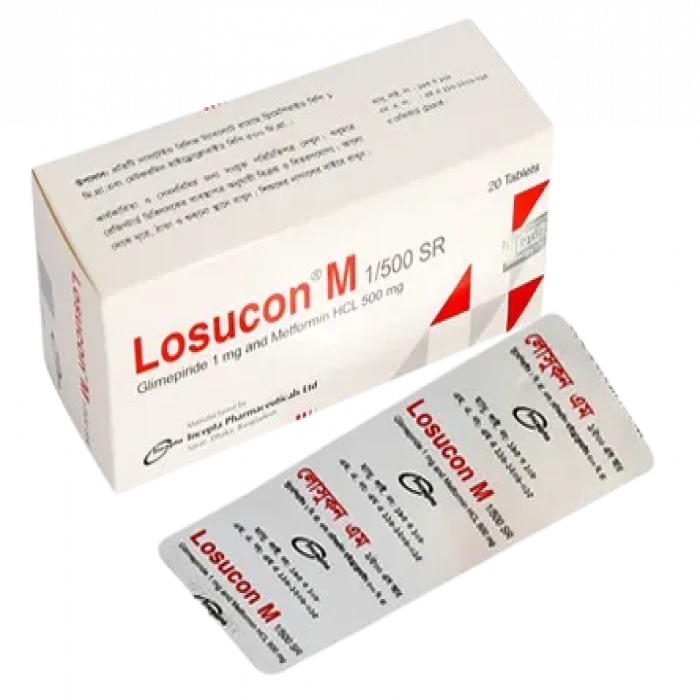

✔ 100% Authentic Product
👁️ Currently Viewing 3808
Amaryl M 1mg Tablet
(Metformin 500mg + Glimepiride 1mg) is used to treat type 2 diabetes mellitus; when diet, exercise, and glimepiride or metformin alone are not able to control the blood sugar levels.
Discount
Price: ৳ 113
MRP:
৳
120
6%
Off

100% Genuine Products, Guaranteed

Safe & Secure Payments, Always

Fast, Secure & Efficient Delivery

Proper Packaging
 Cash on Delivery - All over Bangladesh
Cash on Delivery - All over Bangladesh Regular Delivery - 12-24 Hours, Dhaka City* Charge Tk.39-59
Regular Delivery - 12-24 Hours, Dhaka City* Charge Tk.39-59 Regular Delivery - 24-48 Hours, Other Cities* Charge Tk.99-110
Regular Delivery - 24-48 Hours, Other Cities* Charge Tk.99-110
 ফ্রি ডেলিভারিঃ - ৯৯৯ টাকা+ অর্ডারে, ঢাকা
শহরে
ফ্রি ডেলিভারিঃ - ৯৯৯ টাকা+ অর্ডারে, ঢাকা
শহরে ফ্রি ডেলিভারিঃ - ২৯৯৯ টাকা+ অর্ডারে, ঢাকার
বাহিরে
ফ্রি ডেলিভারিঃ - ২৯৯৯ টাকা+ অর্ডারে, ঢাকার
বাহিরে
100% Genuine Products, Guaranteed
Safe & Secure Payments, Always
Fast, Secure & Efficient Delivery
Proper Packaging
 Cash on Delivery - All over Bangladesh
Cash on Delivery - All over Bangladesh Regular Delivery - 12-24 Hours, Dhaka City* Charge Tk.39-59
Regular Delivery - 12-24 Hours, Dhaka City* Charge Tk.39-59 Regular Delivery - 24-48 Hours, Other Cities* Charge Tk.99-110
Regular Delivery - 24-48 Hours, Other Cities* Charge Tk.99-110 ফ্রি ডেলিভারিঃ - ৯৯৯ টাকা+ অর্ডারে, ঢাকা
শহরে
ফ্রি ডেলিভারিঃ - ৯৯৯ টাকা+ অর্ডারে, ঢাকা
শহরে ফ্রি ডেলিভারিঃ - ২৯৯৯ টাকা+ অর্ডারে, ঢাকার
বাহিরে
ফ্রি ডেলিভারিঃ - ২৯৯৯ টাকা+ অর্ডারে, ঢাকার
বাহিরে
✅ Description:
- Amaryl M 1mg Tablet belongs to the class of anti-diabetic drugs and is used to treat type 2 diabetes when diet and exercise alone are insufficient in controlling blood sugar levels.
- Type 2 diabetes is a chronic condition characterized by insufficient insulin production or insulin resistance, affecting glucose processing in the body.
- The tablet contains two antidiabetic drugs: Glimepiride and Metformin. Glimepiride stimulates insulin production, while Metformin PR (prolonged-release) reduces sugar production in the liver, delays sugar absorption from the intestines, and enhances muscle cell sensitivity to insulin.
- Take Amaryl M 1mg Tablet as prescribed by your doctor. Continue the medication as directed based on your medical condition.
- Inform your doctor if you're allergic toAmaryl M 1mg Tablet or any other medications. The medication is not recommended for children. Avoid breastfeeding while taking it.
- Inform your doctor if you're pregnant or planning for pregnancy. The medication may harm the unborn baby.
- Take short, frequent meals and avoid prolonged fasting while on Amaryl M 1mg Tablet.
Safety Advices

Alcohol
UNSAFE
During treatment with Amaryl M 1mg Tablet, it's advisable to avoid alcohol consumption. Alcohol can affect the blood sugar-lowering action of the medication and increase the risk of lactic acidosis.

Pregnancy
CONSULT YOUR DOCTOR
Amaryl M 1mg Tablet should not be taken during pregnancy. If you're planning to become pregnant, consult your doctor before taking this medication.

Breastfeeding
CONSULT YOUR DOCTOR
Avoid taking Amaryl M 1mg Tablet during breastfeeding, as it may pass through breast milk. Seek advice from your doctor before using this medication.

Driving
UNSAFE
If you experience symptoms of low or high blood sugar (dizziness, tiredness, shaking, trembling) or visual problems due to altered blood sugar levels, do not drive or operate machinery.

Kidney
CONSULT YOUR DOCTOR
The medication is not recommended for use in patients with severe kidney disease. For those with kidney disease, the medication should be used with caution and your dose may need adjustment based on kidney function. Consult your doctor before taking Amaryl M 1mg Tablet if you have kidney issues.

Liver
CONSULT YOUR DOCTOR
Amaryl M 1mg Tablet is not recommended for use in individuals with severe liver disease. If you have liver disease, use the medication with caution, and your dose may need adjustment based on liver function. Consult your doctor before taking this medication if you have liver problems.
✔️ Uses of Amaryl M 1mg Tablet
- Type 2 Diabetes Mellitus
✔️ How does Amaryl M 1mg Tablet work?
Glimepiride: This component not only lowers blood sugar levels but also stimulates the pancreas to release more insulin. Insulin is crucial as it helps transport sugar (glucose) from the blood into cells for energy.
Metformin: Its action includes enhancing the body's natural response to insulin, thereby improving the utilization of sugar by cells. It also decreases the liver's production of sugar. This dual mechanism results in better control over blood sugar levels.
✔️ Side Effects of Amaryl M 1mg Tablet
- Stomach pain
- Nausea
- Diarrhea
- Vomiting
- Headache
- Metallic taste
✔️ Quick Suggestions:
- Amaryl M 1mg Tablet is used for managing type 2 diabetes mellitus.
- The tablet contains a combination of glimepiride and metformin as active ingredients.
- Always take the medicine in the exact dose and duration prescribed by your doctor. Do not change the dosage or frequency without consulting your doctor.
- In addition to taking the medication, lifestyle modifications are essential for managing diabetes effectively.
- Engage in regular exercise for at least 30 minutes daily.
- Maintain a healthy weight.
- Manage stress and prioritize adequate sleep.
- Avoid smoking and limit alcohol consumption.
- Eat a balanced diet that includes fruits and vegetables.
- Regularly monitor your blood sugar levels as directed by your doctor.
- Report any significant changes in your blood sugar levels to your healthcare provider.
- Take Amaryl M 1mg Tablet at the same time every day to ensure its effectiveness.
- If you miss a dose, take it as soon as you remember. If it's close to the time for your next dose, take the next dose at the regular time.
- Before starting Amaryl M 1mg Tablet, inform your doctor about your pregnancy status, plans for pregnancy, breastfeeding, and your detailed medical history.
✔️ Indication
This tablet is prescribed for individuals diagnosed with type 2 diabetes mellitus, serving as an adjunct to their diet and exercise regimen. It is particularly recommended in the following scenarios:
When monotherapy with either metformin or glimepiride proves ineffective in achieving the desired level of glycemic control.
As a replacement for the combination therapy of glimepiride and metformin, when necessary.
✔️ Pharmacology
Glimepiride functions as a sulfonylurea antidiabetic agent, effectively lowering blood glucose levels. Its primary mechanism involves stimulating insulin release from functional pancreatic beta cells. Glimepiride collaborates with glucose, enhancing the sensitivity of beta cells to normal glucose stimuli, which leads to insulin secretion. Additionally, Glimepiride may affect liver glucose production, increase peripheral tissue sensitivity to insulin, and enhance glucose uptake. In non-fasting diabetic patients, a single dose of Glimepiride can sustain its hypoglycemic effect for 24 hours.
Metformin Hydrochloride belongs to the biguanide class of antihyperglycemic medications, utilized for type 2 diabetes treatment. It acts differently from sulfonylureas and doesn't induce hypoglycemia. Metformin Hydrochloride lowers both baseline and postprandial plasma glucose levels by reducing hepatic glucose synthesis and intestinal glucose absorption.
✔️ Dosage & Administration of
The dosage of this tablet is determined by the target blood glucose level. Initiate therapy with the lowest effective dose to achieve desired metabolic control. Regular blood and urine glucose monitoring is crucial during treatment. Avoid escalating doses due to errors like missed doses. Glimepiride dose might decrease over time due to increased insulin sensitivity with improved diabetes management. Timely dose reduction or cessation is vital to prevent hypoglycemia. Daily maximum: 8 mg glimepiride, 2000 mg metformin. The initial dose shouldn't exceed the current glimepiride/metformin daily doses to prevent hypoglycemia. Switching from separate glimepiride/metformin therapy must consider current dosage.
Administration: Take the Amaryl tablet whole, with liquid, before or during breakfast. Don't skip meals.
Overdose: Excessive intake may lead to hypoglycemia and lactic acidosis. Symptoms include nausea, restlessness, dizziness, etc. Seek medical attention and consume glucose/sugar products.
Missed Dose: Missing a dose could cause high blood sugar symptoms. Take missed doses as soon as remembered. If close to the next dose, skip and continue the regular schedule. Don't double dose.
✔️ Interaction
Drug-Drug Interactions:
- Amaryl M 1mg Tablets may interact with various medications, including antibiotics (rifampicin, trimethoprim), calcium channel blockers (verapamil), antacids (cimetidine), HIV/AIDS drugs (dolutegravir), heart-related medicine (ranolazine), anticancer drugs (vandetanib, crizotinib, olaparib), antifungals (fluconazole, miconazole), water pill (acetazolamide), antidiabetic drug (insulin), and anticonvulsants (phenytoin). These interactions can affect how Amaryl M 1mg Tablet works in your body or how other medications work.
Drug-Food Interaction:
- It's advised to avoid alcohol consumption while taking Amaryl M 1mg Tablet. Alcohol consumption can increase the risk of lactic acidosis when combined with this medication. Lactic acidosis is a serious condition that requires medical attention.
Drug-Disease Interactions:
- Inform your doctor if you have severe infections, uncontrolled diabetes, lactic acidosis, ketoacidosis, dehydration, or liver or kidney problems before taking Amaryl M 1mg Tablet. These conditions could influence how your body responds to the medication and might require adjustments in dosage or other medical considerations.
As with any medication, it's essential to follow your healthcare provider's instructions carefully and to communicate openly about your medical history, current health status, and any other medications or supplements you might be taking. This will help your doctor make informed decisions about the suitability of Amaryl M 1mg Tablet for your specific circumstances and to minimize the risk of adverse effects or interactions. Always consult your healthcare professional before making any changes to your medication regimen.
✔️ Contraindications
- If you are allergic to metformin, glimepiride, or other ingredients of the Amaryl M 1mg Tablet.
- If you are pregnant or are breastfeeding.
- If you have kidney or liver failure.
- If you have metabolic acidosis (too much acid in the body fluids) like lactic acidosis, diabetic ketoacidosis or diabetic pre-coma.
- If you suffer from dehydration, severe infections, shock and injections containing iodine.
- If you have or had heart or lung failure, the incidence of heart attack and shock.
- If you are an alcoholic.
✔️ Pregnancy & Lactation
Pregnancy:
- Glimepiride: It is advised not to take Glimepiride during pregnancy, as there is a risk of harm to the developing child. Pregnant patients with diabetes are recommended to switch to insulin for managing their blood glucose levels. If you're planning a pregnancy, it's essential to inform your physician, and they may suggest transitioning to insulin.
- Metformin: During pregnancy, it's generally not recommended to treat diabetes with metformin. Insulin is usually preferred to maintain blood glucose levels as close to normal as possible. This helps reduce the risk of fetal malformations associated with abnormal blood glucose levels.
Lactation:
- Glimepiride: Breastfeeding women should avoid taking Glimepiride due to the potential risk of the medication being ingested through breast milk and causing harm to the child. If necessary, the patient should consider switching to insulin or discontinuing breastfeeding.
- Metformin: Metformin has been found to be excreted into milk in lactating rats, but similar data in humans is not as readily available. If you're nursing and taking metformin, a decision should be made in consultation with your healthcare provider. Factors such as the importance of the medication to the mother and potential risks to the nursing child should be considered when deciding whether to continue nursing or discontinue metformin.
✔️ Precautions & Warnings
- If you experience hunger, headache, nausea, vomiting, sleepiness, restlessness, aggression, reduced alertness, confusion, shakiness, or dizziness, it could signal low blood sugar. Consume sugar or sweet juice and inform your doctor of possible dose adjustments.
- Pins and needles, numbness, and weakness could occur.
- Undergoing an iodine injection diagnostic test? Alert your doctor.
- Dehydration from diarrhea, vomiting, or limited fluid intake warrants attention.
- Past trauma or upcoming surgery? Notify your healthcare provider.
- Thyroid, kidney, and liver issues? Inform your doctor.
- Irregular meals or skipping them? Watch for symptoms.
- Weight gain? A tailored diet may be recommended.
✔️ Storage Conditions
- Store at room temperature in a dry place.
- Protect it from direct sunlight and moisture.
- Keep it away from children and pets.
⚠️Disclaimer:
At ePharma, we’re committed to providing accurate and accessible health information. However, all content is intended for informational purposes only and should not replace medical advice from a qualified physician. Please consult your healthcare provider for personalized guidance. We aim to support, not substitute, the doctor-patient relationship.








